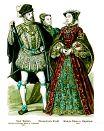|
|
||
|
Robert was chosen as one of the Churchwardens for East Endside Kempston
for the year 1746-7. Any ratepayer could be appointed to this job,
which was unpaid, although he could charge for beer when there was a
meeting and a I/- for collecting the rate from the other ratepayers.
Any stranger passing through the village and needing help could apply
to the Churchwardens for alms. These were usually people being sent
back to their home parish who had by law to support any paupers who had
a settlement in their parish. There seemed to have been a lot of
sailors passing through Kempston, which seems strange for an inland parish. These men had probably been press-ganged into the Navy and had now been released and were returning to their homes. Robert gave them small sums of money to help them on their way. He paid the small boys of the village for killing vermin, mostly polecats at 4d each but on one occasion for an otter he paid 2s.6d. He also had to pay out for materials and work for repairs to the Church, for bread & wine for the communion, buy beer for the bell ringers for the bells to be rung on the anniversary of the King's Coronation, his birthday and Guy Fawkes Day. He had to buy a copy of the printed instructions for a Fast. Great Britain was at this time at war with France and also Charles Edward, the Young Pretender had invaded Britain and had won several victories. A National Fast was declared and everyone was instructed to go to Church and pray for our forces to be victorious. For the year Robert was Churchwarden he spent out £7.0s.4?d. |
In 1747, Robert's daughter Mary, who was
living and working in the parish of Barton, married William Prudden, a
collarmaker of |
|
 THE BARRATT FAMILY
THE BARRATT FAMILY